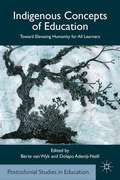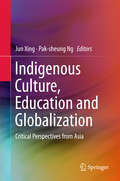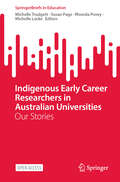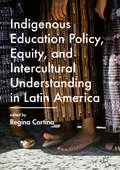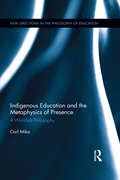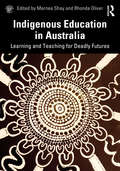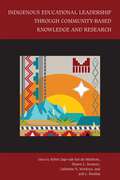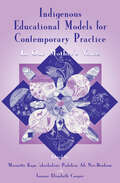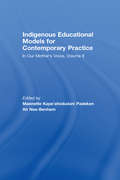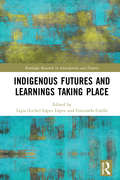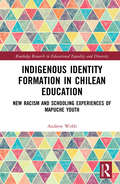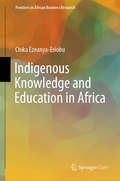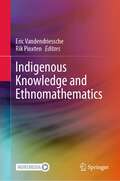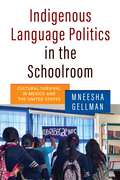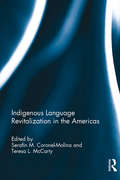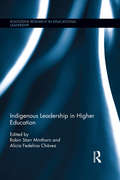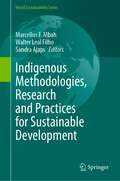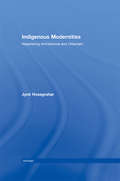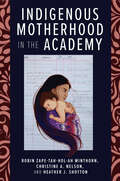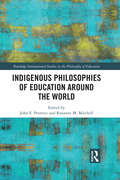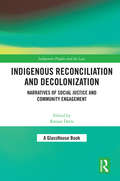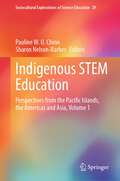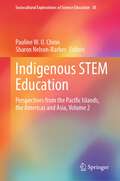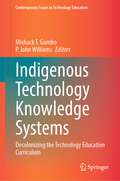- Table View
- List View
Indigenous Concepts Of Education
by Berte Van Wyk Dolapo Adeniji-NeillFeaturing in-depth examinations of concepts of knowing, learning, and education from a range of cultures worldwide, this book offers a rich theory of indigenous concepts of education, their relation to Western concepts, and their potential for creating education that articulates the aspirations of communities and fosters humanity for all learners.
Indigenous Culture, Education and Globalization
by Jun Xing Pak-Sheung NgThe book explores the growing tension between indigenous education, the teaching and learning of native knowledge, cultural heritage and traditions and the dynamics of globalization from the Asian perspective. It brings together a distinguished and multidisciplinary group of Asian scholars and practitioners from Nepal, Korea, India, Japan, Thailand, Indonesia, the Philippines, Hong Kong, Taiwan, mainland China, and the United States. After showcasing six in-depth case studies of local cultural traditions from East, South and Southeast Asia, the book examines a variety of pedagogical strategies in the teaching and learning of indigenous knowledge and culture in the region, reflecting both international trends and the distinctive local and regional characteristics resulting from the tremendous diversity within Asian societies.
Indigenous Early Career Researchers in Australian Universities: Our Stories (SpringerBriefs in Education)
by Susan Page Michelle Locke Michelle Trudgett Rhonda PoveyThis open access book explores the key barriers and facilitators to advancing meaningful and fulfilling academic careers in the higher education sector for Australian Indigenous doctoral graduates. It focuses on the career trajectories of Indigenous early career researchers who have participated in the Developing Indigenous Australian Early Career Researchers study, funded by the Australian Research Council (ARC). It delves into a deeper understanding of the professional development requirements of Indigenous Early Career Research academics and presents a new set of knowledge which incorporates Indigenous standpoints, thus creating new avenues for Indigenous early career researchers to articulate their living experiences and perspectives for the benefit of their colleagues, in the present and the future. This book also provides a model of best practice collaborative approach through its methodology, method, and structural design. The various chapters present first-hand experience with an Indigenist methodological approach, including access to respectful use of culturally appropriate terminology, modelled by the authors and carefully footnoted with explanatory notes. Its writing is also guided by ethical principles concerning Indigenous Intellectual Property Rights. This book serves as a compendium of critique for current and future Indigenous early career researchers, as well as an encouragement for mentors and advocates for equity and parity for Indigenous academics in higher education. Through the voices of Indigenous early career researchers, this book positions universities well to facilitate improved Indigenous outcomes and to continue to pursue educational equity within the higher education sector.
Indigenous Education Policy, Equity, and Intercultural Understanding in Latin America
by Regina CortinaThis book is a comparative study of educational policies over the past two decades in Latin America. These policies, enacted through constitutional reforms, sought to protect the right of Indigenous peoples to a culturally inclusive education. The book assesses the impact of these policies on educational practice and the on-going challenges that countries still face in delivering an equitable and culturally responsive education to Indigenous children and youth. The chapters, each written by an expert in the field, demonstrate how policy changes are transforming education systems in Bolivia, Ecuador, Mexico, and Peru. Going beyond the classroom, they highlight the significance of these reforms in promoting intercultural dialogue in Latin American societies.
Indigenous Education and the Metaphysics of Presence: A Worlded Philosophy (New Directions in the Philosophy of Education)
by Carl MikaIndigenous Education and the Metaphysics of Presence: A worlded philosophy explores a notion of education called ‘worldedness’ that sits at the core of indigenous philosophy. This is the idea that any one thing is constituted by all others and is, therefore, educational to the extent that it is formational. A suggested opposite of this indigenous philosophy is the metaphysics of presence, which describes the tendency in dominant Western philosophy to privilege presence over absence. This book compares these competing philosophies and argues that, even though the metaphysics of presence and the formational notion of education are at odds with each other, they also constitute each other from an indigenous worlded philosophical viewpoint. Drawing on both Maori and Western philosophies, this book demonstrates how the metaphysics of presence is both related and opposed to the indigenous notion of worldedness. Mika explains that presence seeks to fragment things in the world, underpins how indigenous peoples can represent things, and prevents indigenous students, critics, and scholars from reflecting on philosophical colonisation. However, the metaphysics of presence, from an indigenous perspective, is constituted by all other things in the world, and Mika argues that the indigenous student and critic can re-emphasise worldedness and destabilise presence through creative responses, humour, and speculative thinking. This book concludes by positioning well-being within education, because education comprises acts of worldedness and presence. This book will be of key interest to indigenous as well as non-indigenous academics, researchers and postgraduate students in the fields of philosophy of education, indigenous and Western philosophy, political strategy and post-colonial studies. It will also be relevant for those who are interested in philosophies of language, ontology, metaphysics and knowledge.
Indigenous Education in Australia: Learning and Teaching for Deadly Futures
by Rhonda Oliver Marnee ShayThis is an essential, practical resource for pre- and in-service educators on creating contexts for success for Aboriginal and Torres Strait Islander students. Based on the latest research and practice, this book provides an in-depth understanding of the colonised context within which education in Australia is located, with an emphasis on effective strategies for the classroom. Throughout the text, the authors share their personal and professional experiences providing rich examples for readers to learn from. Taking a strengths-based approach, this book will support new and experienced teachers to drive positive educational outcomes for Aboriginal and Torres Strait Islander students.
Indigenous Educational Leadership Through Community-Based Knowledge and Research (Studies in Indigenous Community Building)
by Robin Zape-tah-hol-ah Minthorn, Shawn L. Secatero, Catherine N. Montoya, and Jodi L. BurshiaIndigenous Educational Leadership Through Community-Based Knowledge and Research highlights the heartwork of the Native American Leadership in Education (NALE) program. The edited collection illuminates the beauty and essence of NALE, which uniquely conceptualizes Indigenous leadership identity, philosophy, community leadership, and research in ways that have empowered students and graduates to conceptualize and live out their ancestors&’ prayers and legacy. The editors provide samples of how they have achieved this through the sharing of some of the NALE graduates&’ and current students&’ heartwork. The book is organized into four sections: Indigenous leadership identities, Indigenous leadership philosophies in relation to the Corn Pollen model, Indigenous community leadership curriculum, and Indigenizing research through collective creations. These four sections make the NALE doctoral cohort curriculum and experience unique in how they center Indigenous experience, scholarship, community voice, and research approaches. Collectively, the chapters provide a lens through which one can view and center Indigenous educational leadership.
Indigenous Educational Models for Contemporary Practice: In Our Mother's Voice (Sociocultural, Political, and Historical Studies in Education)
by Maenette K. P. A. Benham Joanne Elizabet CooperWhat is the philosophy that should drive native education policy and practice? In July 1997 a group of native educational leaders from the United States (including Alaska and Hawai'i), Canada, Australia, and New Zealand gathered to define a potential solution to this question. This book passes on the individual educational philosophies of the participants and captures the essence of each in a dynamic, transformational, and holistic model--"Go to the Source"--which forwards a collective vision for a native language- and culture-based educational philosophy that native educational leaders and teachers, policymakers, and curriculum developers can use to ground their work. For more information visit http://ed-web2.educ.msu.edu/voice/
Indigenous Educational Models for Contemporary Practice: In Our Mother's Voice, Volume II (Sociocultural, Political, and Historical Studies in Education)
by Maenette Kape‘ahiokalani Padeken Ah Nee-BenhamThe book challenges teachers, researchers, educational leaders, and community stakeholders to build dynamic learning environments through which indigenous learners can be "Boldly Indigenous in a Global World!" Three days of focused dialogue at the 2005 World Indigenous Peoples Conference on Education (WIPCE) led to the charge to create Volume II of Indigenous Educational Models for Contemporary Practice: In Our Mother’s Voice. Building on the first volume, Volume II examines these topics: Regenerating and transforming language and culture pedagogy that reminds us that what is "Contemporary is Native" Living indigenous leadership that engages and ensures the presence, readiness, and civic work of our next generation of leaders Indigenizing assessment and accountability that makes certain that native values and strengths lead this important work Highlighting the power of partnerships that begin with the child-elder, which is then nurtured in community and institutions to cross boundaries of cultural difference, physical geography, native and non-native institutions and communities Indigenous Educational Models for Contemporary Practice: In Our Mother’s Voice, Volume II honors the wisdom of our ancestors, highlights the diversity of our indigenous stories, and illuminates the passion of forward-looking scholars.
Indigenous Futures and Learnings Taking Place (Routledge Research in Anticipation and Futures)
by Ligia López LópezSingularizing progressive time binds pasts, presents, and futures to cause-effect chains overdetermining existence in education and social life more broadly. Indigenous Futures and Learnings Taking Place disrupts the common sense of "futures" in education or "knowledge for the future" by examining the multiplicity of possible destinies in coexistent experiences of living and learning. Taking place is the intention this book has to embody and world multiplicity across the landscapes that sustain life. The book contends that Indigenous perspectives open spaces for new forms of sociality and relationships with knowledge, time, and landscapes. Through Goanna walking and caring for Country; conjuring encounters between forests, humans, and the more-than-human; dreams, dream literacies, and planes of existence; the spirit realm taking place; ancestral luchas; Musquem hən̓q̓əmin̓əm̓ Land pedagogies; and resoluteness and gratitude for atunhetsla/the spirit within, the chapters in the collection become politicocultural and (hi)storical statements challenging the singular order of the future towards multiple encounters of all that is to come. In doing so, Indigenous Futures and Learnings Taking Place offers various points of departure to (hi)story educational futures more responsive to the multiplicities of lives in what has not yet become. The contributors in this volume are Indigenous women, women of Indigenous backgrounds, Black, Red, and Brown women, and women whose scholarship is committed to Indigenous matters across spaces and times. Their work in the chapters often defies prescriptions of academic conventions, and at times occupies them to enunciate ontologies of the not yet. As people historically fabricated "women," their scholarly production critically intervenes on time to break teleological education that births patriarchal-ized and master-ized forms of living. What emerges are presences that undiscipline education and educationalized social life breaking futures out of time. This book will be of great interest to students and scholars of Indigenous studies, future studies, post-colonial studies in education, settler colonialism and coloniality, diversity and multiculturalism in education, and international comparative education.
Indigenous Identity Formation in Chilean Education: New Racism and Schooling Experiences of Mapuche Youth (Routledge Research in Educational Equality and Diversity)
by Andrew WebbThis book offers rich sociological analysis of the ways in which educational institutions influence indigenous identity formation in Chile. In doing so, Webb explores the mechanisms of new racism in schooling and demonstrates how continued forms of exclusion impact minority groups. By drawing on qualitative research conducted with Mapuche youth in schools in rural and urban settings, and in private state-subsidised and public schools, this volume provides a comprehensive exploration of how national belonging and indigeneity are articulated and experienced in institutional contexts. Close analysis of student and teacher narratives illustrates the reproduction of historically constructed ethnic and racial criteria, and demonstrates how these norms persist in schools, despite apparently progressive attitudes toward racism and colonial education in Chile. This critical perspective highlights the continued prevalence of implicit racism whereby schooling produces culturally subjective and exclusionary norms and values. By foregrounding contemporary issues of indigenous identity and education in Chile, this book adds important scholarship to the field. The text will be of interest to researchers, academics, and scholars in the fields of indigenous education, sociology of education, and international and comparative education.
Indigenous Knowledge and Education in Africa (Frontiers in African Business Research)
by Chika Ezeanya-EsiobuThis open access book presents a strong philosophical, theoretical and practical argument for the mainstreaming of indigenous knowledge in curricula development, and in teaching and learning across the African continent. Since the dawn of political independence in Africa, there has been an ongoing search for the kind of education that will create a class of principled and innovative citizens who are sensitive to and committed to the needs of the continent. When indigenous or environment-generated knowledge forms the basis of learning in classrooms, learners are able to immediately connect their education with their lived reality. The result is much introspection, creativity and innovation across fields, sectors and disciplines, leading to societal transformation. Drawing on several theoretical assertions, examples from a wide range of disciplines, and experiences gathered from different continents at different points in history, the book establishes that for education to trigger the necessary transformation in Africa, it should be constructed on a strong foundation of learners’ indigenous knowledge.The book presents a distinct and uncharted pathway for Africa to advance sustainably through home-grown and grassroots based ideas, leading to advances in science and technology, growth of indigenous African business and the transformation of Africans into conscious and active participants in the continent’s progress. Indigenous Knowledge and Education in Africa is of interest to educators, entrepreneurs, policymakers, researchers and individuals engaged in finding sustainable and strategic solutions to regional and global advancement.
Indigenous Knowledge and Ethnomathematics
by Rik Pinxten Eric VandendriesscheThe book presents a series of ethnographic studies, which illustrate issues of wider importance, such as the role of cultural traditions, concepts and learning procedures in the development of formal (or mathematical) thinking outside of the western tradition. It focuses on research at the crossroads of anthropology and ethnomathematics to document indigenous mathematical knowledge and its inclusion in specific cultural patterns. More generally, the book demonstrates the heuristic value of crossing ethnographical, anthropological and ethnomathematical approaches to highlight and analyze—or "formalize" with a pedagogical outlook—indigenous mathematical knowledge.The book is divided into three parts. The first part extensively analyzes theoretical claims using particular ethnographic data, while revealing the structural mathematical features of different ludic, graphic, or technical/procedural practices in their links to other cultural phenomena. In the second part, new empirical studies that add data and perspectives from the body of studies on indigenous knowledge systems to the ongoing discussions in mathematics education in and for diverse cultural traditions are presented. This part considers, on the one hand, the Brazilian work in this field; on the other hand, it brings ethnographic innovation from other parts of the world. The third part comprises a broad philosophical discussion of the impact of intuitive or "ontological" premises on mathematical thinking and education in the light of recent developments within so-called indigenously inspired thinking. Finally, the editors’ conclusions aim to invite the broad and diversified field of scholars in this domain of research to seek alternative approaches for understanding mathematical reasoning and the adjacent adequate educational goals and means.This book is of interest to scholars and students in anthropology, ethnomathematics, history and philosophy of science, mathematics, and mathematics education, as well as other individuals interested in these topics.
Indigenous Language Politics in the Schoolroom: Cultural Survival in Mexico and the United States
by Mneesha GellmanPublic school classrooms around the world have the power to shape and transform youth culture and identity. In this book, Mneesha Gellman examines how Indigenous high school students resist assimilation and assert their identities through access to Indigenous language classes in public schools. Drawing on ethnographic accounts, qualitative interviews, focus groups, and surveys, Gellman’s fieldwork examines and compares the experiences of students in Yurok language courses in Northern California and Zapotec courses in Oaxaca, Mexico. She contends that this access to Indigenous language instruction in secondary schooling serves as an arena for Indigenous students to develop their sense of identity and agency, and provides them tools and strategies for civic, social, and political participation, sometimes in unexpected ways.Showcasing young people’s voices, and those of their teachers and community members, in the fight for culturally relevant curricula and educational success, Gellman demonstrates how the Indigenous language classroom enables students to understand, articulate, and resist the systemic erasure and destruction of their culture embedded in state agendas and educational curricula. Access to Indigenous language education, she shows, has positive effects not only for Indigenous students, but for their non-Indigenous peers as well, enabling them to become allies in the struggle for Indigenous cultural survival. Through collaborative methodology that engages in research with, not on, Indigenous communities, Indigenous Language Politics in the Schoolroom explores what it means to be young, Indigenous, and working for social change in the twenty-first century.
Indigenous Language Revitalization in the Americas
by Serafín M. Coronel-Molina Teresa L. McCartyFocusing on the Americas – home to 40 to 50 million Indigenous people – this book explores the history and current state of Indigenous language revitalization across this vast region. Complementary chapters on the USA and Canada, and Latin America and the Caribbean, offer a panoramic view while tracing nuanced trajectories of "top down" (official) and "bottom up" (grass roots) language planning and policy initiatives. Authored by leading Indigenous and non-Indigenous scholars, the book is organized around seven overarching themes: Policy and Politics; Processes of Language Shift and Revitalization; The Home-School-Community Interface; Local and Global Perspectives; Linguistic Human Rights; Revitalization Programs and Impacts; New Domains for Indigenous Languages Providing a comprehensive, hemisphere-wide scholarly and practical source, this singular collection simultaneously fills a gap in the language revitalization literature and contributes to Indigenous language revitalization efforts.
Indigenous Leadership in Higher Education (Routledge Research in Educational Leadership)
by Robin Minthorn Alicia Fedelina ChavezThis volume offers new perspectives from Indigenous leaders in academic affairs, student affairs and central administration to improve colleges and universities in service to Indigenous students and professionals. It discusses and illustrates ways that leadership norms, values, assumptions and behaviors can often find their origins in cultural identities, and how such assumptions can affect the evolvement of colleges and universities in serving Indigenous Peoples. It contributes to leadership development and reflection among novice, experienced, and emerging leaders in higher education and provides key recommendations for transforming higher education. This book introduces readers to relationships between Indigenous identities and leadership in diverse educational environments and institutions and will benefit policy makers in education, student affairs professionals, scholars, faculty and students.
Indigenous Methodologies, Research and Practices for Sustainable Development (World Sustainability Series)
by Walter Leal Filho Marcellus F. Mbah Sandra AjapsThis book states that whilst academic research has long been grounded on the idea of western or scientific epistemologies, this often does not capture the uniqueness of Indigenous contexts, and particularly as it relates to the achievement of the United Nations Sustainable Development Goals (SDGs). The SDGs were announced in 2015, accompanied by 17 goals and 169 targets. These goals are the means through which Agenda 2030 for sustainable development is to be pursued and realised over the next 15 years, and the contributions of Indigenous peoples are essential to achieving these goals.Indigenous peoples can be found in practically every region of the world, living on ancestral homelands in major cities, rainforests, mountain regions, desert plains, the arctic, and small Pacific Islands. Their languages, knowledges, and values are rooted in the landscapes and natural resources within their territories.However, many Indigenous peoples are now minorities within their homelands and globally, and there is a dearth of research based on Indigenous epistemologies and methodologies. Furthermore, academic research on Indigenous peoples is typically based on western lenses. Thus, the paucity of Indigenous methodologies within mainstream research discourses present challenges for implementing practical research designs and interpretations that can address epistemological distinctiveness within Indigenous communities.There is therefore the need to articulate, as well as bring to the nexus of research aimed at fostering sustainable development, a decolonising perspective in research design and practice.This is what this book wants to achieve. The contributions critically reflect on Indigenous approaches to research design and implementation, towards achieving the sustainable development goals, as well as the associated challenges and opportunities. The contributions also advanced knowledge, theory, and practice of Indigenous methodologies for sustainable development.
Indigenous Methodologies: Characteristics, Conversations, and Contexts, Second Edition
by Margaret KovachIndigenous Methodologies is a groundbreaking text. Since its original publication in 2009, it has become the most trusted guide used in the study of Indigenous methodologies and has been adopted in university courses around the world. It provides a conceptual framework for implementing Indigenous methodologies and serves as a useful entry point for those wishing to learn more broadly about Indigenous research. The second edition incorporates new literature along with substantial updates, including a thorough discussion of Indigenous theory and analysis, new chapters on community partnership and capacity building, an added focus on oracy and other forms of knowledge dissemination, and a renewed call to decolonize the academy. The second edition also includes discussion questions to enhance classroom interaction with the text. In a field that continues to grow and evolve, and as universities and researchers strive to learn and apply Indigenous-informed research, this important new edition introduces readers to the principles and practices of Indigenous methodologies.
Indigenous Modernities: Negotiating Architecture and Urbanism (Architext)
by Jyoti HosagraharThis book examines how a historic and so-called 'traditional' city quietly evolved into one that was modern in its own terms; in form, use and meaning. Through a focused study of Delhi, the author challenges prevalent assumptions in architecture and urbanism to identify an interpretation of modernism that goes beyond conventional understanding. Part one reflects on transformations and discontinuities in built form and spatial culture and questions accepted notions of the static nature of what is normally referred to as traditional and non-Western architecture. Part two is a critical discussion of Delhi in the nineteenth and early twentieth centuries, redefining modernism in a way that separates the city's architecture and society from the objectified realm of the exotic whilst acknowledging non-Western ideas of modernity. In the final part the author considers 'indigenous modernities': the irregular, the uneven and the unexpected in what uncritical observers might call a coherent 'traditional' society and built environment.
Indigenous Motherhood in the Academy
by Heather J. Shotton Charlotte Davidson Stephanie Waterman Christine A. Nelson Kaiwipuni Lipe Pearl Brower Nicole Reyes Miranda Belarde-Lewis Tiffany S. Lee Leola Tsinnajinnie-Paquin Susan Faircloth Nizhoni Chow-Garcia Michelle Johnson-Jennings Alayah Johnson-Jennings Ahnili Johnson-Jennings Dwanna L. McKay Shelly Lowe Tria Blu Wakpa Symphony Oxendine Denise Henning Renée Holt Robin Zape-tah-hol-ah Minthorn Otakuye Conroy-Ben Theresa Gregor Sloan Woska-pi-mi Shotton Erin Kahunawaika?ala WrightIndigenous Motherhood in the Academy highlights the experiences and narratives emerging from Indigenous mothers in the academy who are negotiating their roles in multiple contexts. The essays in this volume contribute to the broader higher education literature and the literature on Indigenous representation in the academy, filling a longtime gap that has excluded Indigenous women scholar voices. This book covers diverse topics such as the journey to motherhood, lessons through motherhood, acknowledging ancestors and grandparents in one’s mothering, how historical trauma and violence plague the past, and balancing mothering through the healing process. More specific to Indigenous motherhood in the academy is how culture and place impacts mothering (specifically, if Indigenous mothers are not in their traditional homelands as they raise their children), how academia impacts mothering, how mothering impacts scholarship, and how to negotiate loss and other complexities between motherhood and one’s role in the academy.
Indigenous Philosophies of Education Around the World (Routledge International Studies in the Philosophy of Education #19)
by John E. Petrovic Roxanne M. MitchellThis volume explores conceptualizations of indigeneity and the ways that indigenous philosophies can and should inform educational policy and practice. Beginning with questions and philosophies of indigeneity itself, the volume then covers the indigenous philosophies and practices of a range of communities—including Sami, Maori, Walpiri, Navajo and Kokama peoples. Chapter authors examine how these different ideals can inform and create meaningful educational experiences for communities that reflect indigenous ways of life. By applying them in informing a philosophy of education that is particular and relevant to a given indigenous community, this study aims to help policy makers and educational practitioners create meaningful educational experiences.
Indigenous Reconciliation and Decolonization: Narratives of Social Justice and Community Engagement (Indigenous Peoples and the Law)
by Ranjan DattaThis book addresses the ethical and practical issues at stake in the reconciliation of Indigenous and non-indigenous communities. An increasing number of researchers, educators, and social and environmental activists are eager to find ways to effectively support ongoing attempts to recognize, integrate and promote Indigenous perspectives and communities. Taking Canada as its focus, this book offers a multidisciplinary consideration of a range of reconciliation policies, practices and initiatives that are relevant in all settler states. Set against its increasing neoliberal appropriation, the book resituates reconciliation in the everyday contexts of community interaction and engagement, as well as in the important areas of Indigenous knowledge, resource management and social and environmental justice. Reconciliation is not just the responsibility of law and government. And, attuned to the different perspectives of settlers, migrants and refugee communities, the book examines areas of opportunity, as well as obstacles to progress, in the forging of a truly decolonizing framework for reconciliation. As the challenges of reconciliation cross numerous academic and substantial areas, this book will appeal to a range of scholars and practitioners working in law, politics, education, environmental studies, anthropology and Indigenous studies.
Indigenous STEM Education: Perspectives from the Pacific Islands, the Americas and Asia, Volume 1 (Sociocultural Explorations of Science Education #29)
by Sharon Nelson-Barber Pauline W. U. ChinnThis book explores ways in which systems of local knowledge, culture, language, and place are foundational for STEM learning in Indigenous communities. It is part of a two-volume set that addresses a growing recognition that interdisciplinary, cross-cultural and cross-hybrid learning is needed to foster scientific and cultural understandings and move STEM learning toward more just and sustainable futures for all learners. Themes of learning from elders, through practice and place-based experiences are found across cultures. Each chapter brings a uniquely Indigenous point of view to the educational transformation efforts taking place in these distinct contexts. In the second section the chapters use authentic research stories to explain many ways in which regular disciplinary policies and practices can impact Indigenous students’ participation in STEM classrooms and careers. These authors go on to discuss ways to engage learners in STEM activities that are interconnected with the contexts of their lives.
Indigenous STEM Education: Perspectives from the Pacific Islands, the Americas and Asia, Volume 2 (Sociocultural Explorations of Science Education #30)
by Sharon Nelson-Barber Pauline W. U. ChinnThis book builds upon the range of Indigenous theory and research found in Volume I and applies these learnings to interventions in schools, communities, teacher education and professional development. It is part of a two-volume set addresses a growing recognition that interdisciplinary, cross-cultural and cross-hybrid learning is needed to foster scientific and cultural understandings and move STEM learning toward more just and sustainable futures for all learners. Authors working in Eurocentric settings of schools and colleges—whether in the continental or island United States, Canada, Thailand, Taiwan or Chuuk—utilize storytelling, place, language and experiential learning to engage students in meaningful, highly contextualized study that honors ancestral knowledge and practices. They recognize that their disciplines have been structured and colonized by Eurocentric/American frameworks that lack storied, ethical contexts developed through living sustainably in particular places. Recognizing that students seeking to enter STEM majors and careers now must be knowledgeable in multiple ways, authors describe innovative ways to immerse precollege learners as well as developing and practicing teachers in settings that intersect culture, place, heritage language, and praxis that enable Indigenous and local knowledge to become central to learning. Twenty-first century technologies of distance learning, digital story-telling, and mapping technologies now enable formerly marginalized, minoritized groups to share their worldviews and systems of knowledge.
Indigenous Technology Knowledge Systems: Decolonizing the Technology Education Curriculum (Contemporary Issues in Technology Education)
by P. John Williams Mishack T. GumboThere has been a growing interest in indigenous knowledge systems and research. This interest has been mainly triggered by the need to decolonize education as a response to the colonial onslaught on indigenous knowledge and people. Research has, however, concentrated on the generality of the indigenous knowledge system rather than on its related dimensions. One area that has suffered a lack of attention is indigenous conceptions of science, technology, engineering, and mathematics (STEM) despite the unquestionable evidence of STEM in indigenous contexts. Most STEM is presented by colonial establishments and representations, especially in developed/modern/urban contexts, which portray STEM as a colonial construct. This book focuses on indigenous technological knowledge systems education (ITKSE). Indigenous people have been at the front of technological developments from pre-colonial times. The list of precolonial industries, science, and technology is extensive, including blacksmithing, wood-carving, textile-weaving and dyeing, leather works, beadworks, pottery making, architecture, agricultural breeding, metal-working, salt production, gold-smithing, copper-smithing, leather-crafting, soap-making, bronze-casting, canoe-building, brewing, glass-making, and agriculture, for example. In some parts of the world such as Africa and Australia, these technologies still exist. ITKSE should not be left to exist outside of the technology education curriculum and classroom as it can benefit both indigenous students, who have been denied learning about what is relevant to them, and non-indigenous students. These cultural groups can expand their knowledge of technology by learning both ITKSE and Western technological knowledge systems education (WTKSE). ITKSE also presents opportunities for technology teachers to reflect on and revisit their depth of technological knowledge, pedagogies, and assessment. The intent of this book is transformational in the sense that it brings decolonial and indigenous perspectives into the technology education context. It extends technology education in the sense that it will not only influence Western-minded architects, artisans, designers, etc. but encourage indigenous-mindedness as well.
